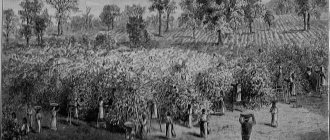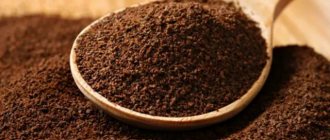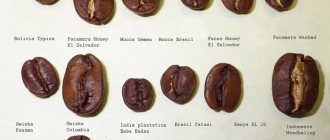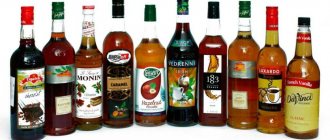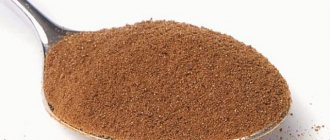The Russian language reform that took place in Russia some time ago caused a lot of controversy. As a result, the name of the delicious drink was allowed to be used in the neuter gender. People who are used to saying that coffee is “he” and not “it” cannot take this change into account and tirelessly correct everyone who uses this word in the neuter gender. Let's figure out how to speak correctly.
"He" or "it"
As of 2021, drinking coffee in both the masculine and neuter genders is considered correct. But many people get annoyed when others say “my coffee” instead of “mine.” According to the latest changes affecting the official dictionary, you can say “delicious” and “delicious”.
But it is better to adhere to the correct form of using the word “coffee” in spoken and written speech. This is important when a specialist prepares a drink. It is necessary to specify which one to serve: freshly brewed or freshly brewed. The first option is freshly ground grains, filled with water and boiled in a Turk. The second option is to pour the finished powder from a jar with boiling water and infuse it.
What to treat - “coffee” or “coffee”
This is a word that came from abroad. Words borrowed from foreign languages remain unchanged in the singular and plural if they end in -e and -o. They cannot be inclined not only in writing, but also in oral speech.
Examples of misspelled words:
- coffee is too bitter;
- I want coffee;
- Mom made delicious coffee;
- you have condensed milk with coffee;
- I splashed myself with coffee.
Correct usage:
- coffee is too strong;
- the coffee has already cooled down;
- waiter, please, one coffee;
- add more coffee.
In literary language, the word “coffee” is masculine. Everyone should learn this.
Coffee shop owners, baristas and anyone who views their favorite drink from a professional point of view will never allow themselves to say “it”. Only "he".
How to spell the word “coffee” correctly?
Modern people associate the word coffee with something aromatic and invigorating. This is one of the symbols of progressive world development. A cup of this drink in the morning is considered the key to a successful day for business and simply active people. Everything related to coffee implies dynamism and purposeful movement towards your goal. For about two thousand years, humanity has been drinking coffee with great pleasure, so the name is used quite often in everyday speech. But here's how to spell the word coffee
, may be difficult for some people. Let's try to figure this out.
A little history
Over time, people began to change the endings and decline in borrowed words. Nouns ending in “e” have become the subject of endless debate. The name of this tonic drink, beloved by many, is borrowed from the English language. According to other sources - from the Netherlands. Coffee is a masculine word. Initially, the drink was called “coffee” or “coffee”.
Over time, the word “coffee” has undergone changes - it began to end with the letter “e”. As a result, a lot of misunderstandings arose and endless disputes began. Previously, schoolchildren were taught that the drink was masculine and they should say “he” and not change numbers and cases. Now is coffee “it”?
What does this word mean?
In modern Russian there are several meanings of the word “coffee”:
- A plant that produces large fruits with grains.
- Beans that are obtained after processing the fruits collected from the coffee tree.
- Ground grain powder.
- A drink that is brewed or infused.
- An extract from ground beans that serves as the basis for the production of instant coffee drinks.
The word retains the masculine gender, singular number and invariable case in all meanings: natural, ground, soluble.
What does the word coffee mean?
The first mentions date back to the 17th century. The ancestor of the invigorating drink is considered to be the town of Kaffa in Ethiopia. Since time immemorial, coffee trees have been grown there to produce coffee beans, although their drink is called completely differently - “buno” or “bunna”.
There is an opinion about the origin of the word from the Arabic “qahwah” - activating, but with a small caveat: it meant a type of wine. The Turks also have a similar word “kahve”. Depending on the characteristics of the language and the pronunciation of individual sounds, this word (or koffa) began to be called in a special manner among different nationalities.
The drink came to Russia in 1724 and was called differently everywhere. In Russian there were even such variations as “kof”, “kofa”, “kefa”, “kohei” and “cafe”. In modern Russian, in current dictionaries the word is written “coffee” and belongs exclusively to the masculine gender.
The spelling of this noun has acquired an unambiguous status and other variants have become unacceptable. Despite the different spellings, the meaning of the word coffee has always remained the same for all consumers of the drink - invigorating, increasing energy.
What has changed in Russian dictionaries
In 2009, several dictionaries were released, which caused confusion among the linguistic community. A team of authors: Cheptsova, Sazonova and Bukchina published a spelling dictionary, where the masculine and neuter genders are indicated next to the word “coffee”. The authors refer to the Big Academic Dictionary, where this word is used in oral speech in the neuter gender. Philologists believed that this did not contradict the rules of the Russian language.
An attempt to classify coffee as a neuter word was unsuccessful. The innovation did not last. Ordinary citizens, teachers and writers who learned from childhood that they should say “mine” and not “mine”, and did not accept the new rule. The masculine gender has been assigned to this noun to this day.
Do you know..
Which option is correct? (according to last week’s statistics, only 32% answered correctly)
No one except Russians cares about what kind of word coffee is, although in the modern world there is not a single corner where it is not drunk. Each country has its own name for this wonderful drink and prepares it according to its own recipes.
Words ending in “e” in Russian are generally classified as neuter, which is why debates in the philological community about the word “coffee” continue. In Russia, the consumption of the drink began in the 17th century.
Then it was called “kofiy” or “coffee” and belonged to the masculine gender. That's why it's a masculine word. This is also written in the main Russian dictionaries of Dahl, Ozhegov and Efremova. But over the years, the letter “th” at the end of the word disappeared and the result was “coffee,” which has survived to this day.
This was the reason for the appearance in Lopatin’s dictionary at the beginning of the 21st century of information about the admissibility of using it in the neuter gender.
- What type of word is coffee and how to say it correctly
“Treat coffee” or “treat coffee”?
History shows that language is very mobile and changes according to time. Some words and rules fall out of use, while others undergo changes. This is what happened with the name of the tart hot drink. The rules for using this word have changed along with our language, and in the 21st century it has again undergone changes, which now cause some difficulties.
So what would be correct: “treat me to coffee” or “treat me to coffee”?
How to spell it correctly?
The correct way to use it is COFFEE.
According to the rules of the Russian language, declension of this word by case is unacceptable.
- offer coffee;
- quench your thirst for coffee;
- bring dessert with coffee.
What kind of word "coffee" is in Russian?
The word appeared in the Russian language in the 17th century during the reign of Peter I. It came along with the hot drink of the same name. In the dictionaries of that time the following forms of usage are found: “coffee” or “coffee”.
Accordingly, the gender of words is defined as masculine.
Over time, the letter “th” disappeared, but the generic affiliation remained. Hence the contradiction that we do not understand. The literary norm is to use the word in the masculine gender. Confirmation can be found in the works of classics: A.S. Pushkina, N.V. Gogol, L.N. Tolstoy.
In 2021, the Ministry of Education made a controversial decision, approving the standards of the modern Russian language. The changes made seemed inappropriate to adherents of the literary language. The word “coffee” has become one of the controversial issues. In modern approved dictionaries, its use in the neuter gender is allowed, according to the realities of our time.
Despite the possibility of two variants of use, the case declension remains unchanged. Words borrowed from another language and ending in “-e” or “-o” remain in the nominative singular case in any form.
- I asked the waiter to bring strong coffee.
- I like to eat oatmeal for breakfast and always with coffee.
Etymology of the word "coffee"
The word came to us from the Arabic language (qahwah), where it meant a wine drink. Appeared in European languages through Turkish kahve.
It appeared in Russian in the 17th century and originally sounded like coffee or coffee.
Which is correct: “grinds coffee”, “grinds coffee” or “grinds coffee”
The drink is prepared from coffee beans that are pre-ground. And here the question arises: how to correctly agree the verb with the noun “coffee”.
- I grind coffee;
- you grind coffee;
- you grind coffee;
- he/she grinds coffee;
- they grind coffee.
Although both masculine and neuter forms are considered acceptable as of 2021, most people continue to use it as in classical literature (masculine).
It is important to remember that, regardless of gender, the word is not declined according to cases. Remains in singular and nominative case.
Source: https://znanieinfo.ru/orfografiya/ugostit-kofe-ili-ugostit-kofem.html
An invigorating word from abroad.
The Russian language is indeed very rich in many foreign words that came to us from other countries. So the word “coffee” appeared in our country only in 1724 with the advent of this drink in our country. And it came to us from the Turkish language.
By the way, the word itself comes from the name of the region in Ethiopia - Kaffa, which is considered the birthplace of the coffee tree.
Then in our country the word changed in different ways: there was “coffee”, and “coffee”, and “coffee”. But in the 20th century they settled on the final option: coffee. Now let's figure out how it is written in various sentences?
In our language, the masculine noun “coffee” is not declined by case and is always used in its original form. Therefore, it would be correct to write the expression: enjoy coffee. For example: He spilled a hot mug of coffee.
What is most surprising is that this one word means: the coffee tree itself, its beans and the drink that is obtained as a result of roasting and milking these beans.
Analysis by composition:
coffee - root; ending null; coffee is the basis of the word.
k - [k] - consonant, paired deaf, paired hard o - [o] - vowel, stressed f - [f'] - consonant, paired deaf, paired soft e - [e] - vowel, unstressed The word has 4 letters and 4 sounds.
Only Marina Khlebnikova can afford to show in her song -
But singers and poets are allowed everything to create an image. In the normative rules of the Russian language, the word coffee is not declined, since it, the word, is alien and wandered into our lexicon from a foreign language. Regardless of any combination of phrases, the word coffee will remain unchanged, just as the love of millions of people for it and my personal love for it remains unchanged. Enjoy your coffee with me.
The word "coffee" is a masculine noun.
A foreign word borrowed from Arabic, the word “qahva” previously meant “a type of wine.” Subsequently, it came into the Russian language from the Turkish language. Means a strong invigorating drink.
Meaning of the word
The concept of “coffee” came to us from the Arabic language – “kakhwa”. It has two common meanings:
- An evergreen tree growing in the tropics. There are over eighty species of this plant, but only two are of food and agricultural value to humans - robusta and arabica.
- A food product obtained by roasting and grinding coffee beans - the seeds of the coffee tree. It is used to prepare the world's favorite aromatic and invigorating drink. After careful processing, instant coffee is obtained in the form of granules or powder.
